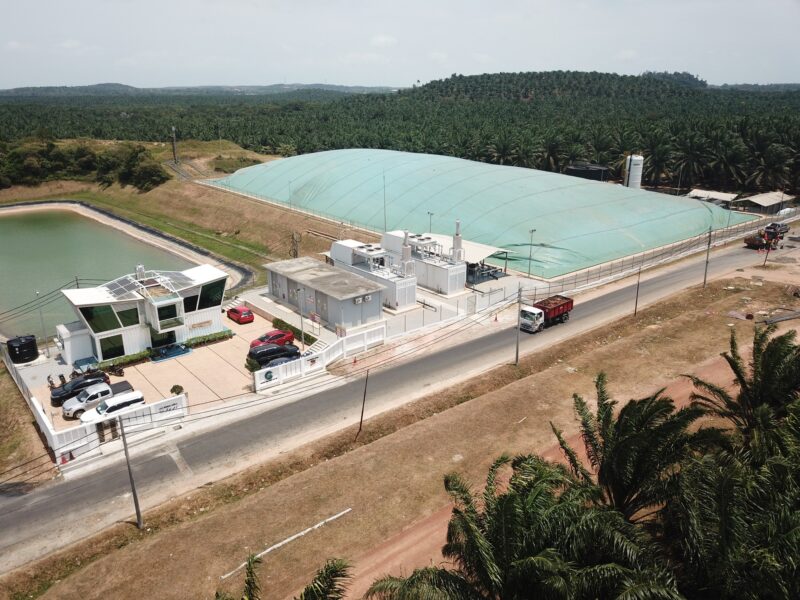
This site
is mobile
responsive
The Concord Group of Companies is a leading developer of renewable energy (biogas) power plants and have won awards such as the National Energy Awards 2020 by the Ministry of Energy and Natural Resources, and the 2nd Runner Up for ASEAN Energy Awards 2020 by the ASEAN Centre for Energy. The parent company, Concord Alliance Sdn Bhd (CASB), started venturing into the Renewable Energy (RE) sector in 2014 and to date, the Group comprises 13 companies with operations in Malaysia and Indonesia.
The Concord Group develops biogas plants at palm oil mills to harness the waste from the palm oil mills known as “POME” (Palm Oil Mill Effluent) to produce biogas for the generation of electric power for sale to Tenaga Nasional Berhad (TNB), under the Feed-in Tariff (FIT) mechanism under Sustainable Energy Authority Development (SEDA) Malaysia.
In Malaysia, there are currently four (4) biogas plants that have been successfully in operation within the Group and with two (2) more to be commissioned before the end of 2021. Another plant has just commenced development with a planned completion date by end-2022. The biogas plants being implemented at palm oil mills benefit the environment by improving the wastewater treatment process, mitigates climate change by reducing greenhouse gas emissions (methane and carbon dioxide) and produces clean, renewable energy.
Current Progress
The Concord Group has developed four (4) greenfield biogas plants at palm oil mills owned by the FGV Group in Pahang and Johor, with a total output of 5.6 MW that is exported to the TNB national grid. All four (4) plants were successfully commissioned between the end of 2018 and first half of 2019, and are now in full operation.


Currently, the Group is developing more biogas plants at other plantation companies. At Kumpulan TDM Berhad in Terengganu, two (2) plants are nearing completion and one more at a RISDA palm oil mill in Pahang is slated for completion by end-2022. There are four (4) more biogas plants in the pipeline with esteemed partners such as Sime Darby Plantation Berhad and Yayasan Pahang, among others.
Concord Group has also ventured into Indonesia as EPCC contractors where two (2) biogas plants have been constructed and commissioned. Of which, the latest is being used for the production of bio-compressed natural gas (bio-CNG) and utilisation of biogas for use as a renewable fuel in vehicles and power production in East Kalimantan.
All these biogas plants provide career opportunities for locals such as those of the FELDA settler communities, during both the construction and operational stages.

They are engaged in the management and operation of the plants, as the Group has always prioritised employment to the local community. With a growing presence across Malaysia and Indonesia, Concord Group positions itself as one of the regional industry leaders for the biogas sector and will continue to expand.
Growth Factors
The decision for Concord Group to set up operations and venture into the RE business is mainly driven by the adequate fiscal and financial support made available by the Government of Malaysia and the various ministries and agencies.
The support received is in the form of a green income tax incentive under the Pioneer Status granted by MIDA, project loan interest rebate under the Green Technology Financing Scheme (GTFS) by the Malaysian Green Technology and Climate Change Centre (MGTC),loan guarantee by Credit Guarantee Corporation Malaysia Berhad (CGC), financial support by way of a grant from TERAJU and financing by Bioeconomy Corporation under the Bioeconomy Transformation Programme (BTP).
These incentives were an attractive factor in the decisionmaking process for the Group when considering to venture into this industry. More importantly, the FiT business model under SEDA Malaysia provides a good locked-in tariff rate which is guaranteed for the full tenure of 21 years under the Renewable Energy Power Purchase Agreement (REPPA), signed with Tenaga Nasional Berhad. This business model ensures longterm sustainability for the Group.
Investing in RE
There has been a progressive shift by the Government in promoting Renewable Energy (RE) with the objective of creating a better and cleaner environment.
Towards this end, the Government is committed to the target of having RE in the National Energy Mix of 31% by 2025. This gives rise to tremendous business opportunities for the development of RE. Biogas technology provides one of the solutions that complement other forms of RE such as solar photovoltaic, hydro and wind.
As most biogas technologies have been localised, it has matured and is well-suited to the local climate and feedstock characteristics. The harnessing of feedstock, which is essentially waste material, into useful by products also contributes towards lessening the pollution of rivers and contributes to improving the environment.
Funding is available for the RE or biogas industry with good fiscal support from the Government. Many financial institutions have started to lend to the RE industry and offer competitive funding options.
The RE industry is considered to be a sunrise industry as the world transitions to cleaner forms of energy and thereby, afford lots of opportunities to businesses. Furthermore, Malaysia is blessed with an abundance of raw material (POME) within the palm oil industry and has the best government incentives and policy frameworks within the region.
Source: MIDA e-Newsletter August 2021